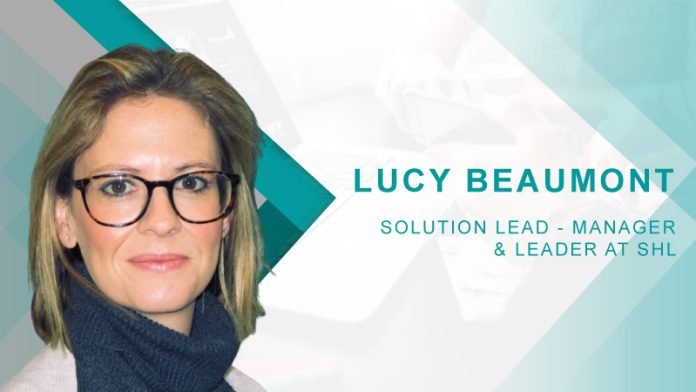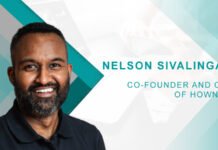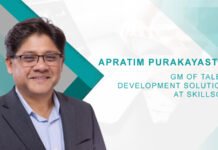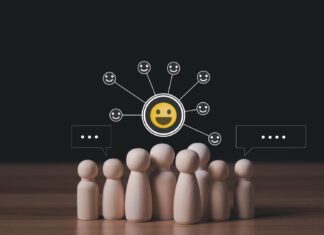Lucy, as a Solution Lead – Manager and leader for SHL, please tell us how you perceive the ongoing global discussions around AI regulation, given its impact on technology and organizations.
I’m encouraged that the world is taking AI regulation seriously. We are seeing policy makers, businesses and societies coming together to discuss this transformative technology and the risks that it can pose. However, we are at a very early stage of this discussion and there is much more to be done. When it comes to HR and specifically people assessment, any LLM based model must be handled with great care to ensure that it is learning from representative and appropriate content.
The Occupational Psychology community has come together to tackle this topic. In doing so, we will make greater advances, sharing knowledge and learning on a technology that has taken the world by storm.
At SHL, we have our dedicated SHL Labs – a powerhouse of innovation with $30 million investment. SHL Labs is made up of I/O Psychologists and AI Specialists who are dedicated to advancing innovation, within ethical and regulatory parameters. So, when it comes to AI, I believe that SHL will be at the forefront of innovation and our clients can feel reassured that SHL will continue to bring science, technology and best practice to talent acquisition and talent management.
How has the prominence of AI in 2023 shaped your perspective on technology, especially considering the lack of regulation?
In many ways I’ve seen ‘AI’ as a buzzword in 2023 with few people truly understanding the mechanics, implications, and potential of the technology. In such a context, it can be overwhelming and confusing, and I see that in my clients’ questions. I want to change that narrative so that we, as an industry can embrace AI and the incredible value it can bring to HR. In real terms, business has not made great leap forwards when it comes to productivity in the last 20 years, with the exception of manufacturing. AI is the great leap forward that we’ve been waiting for.
I would encourage HR to be cautious when it comes to new HR AI tech. Hold providers accountable to explain how the technology works, and prove it is not going to cause harm. But where AI is being used appropriately, we can be excited about the benefits it will bring. We are in a grey space right now, we have the tech, but limited regulation. During this period HR needs to be cautious, seeking out robust providers who are grounded in science and ethics, while we await further regulation. It’s coming, but in the meantime don’t be fooled by sparkly AI HR tech that you don’t understand.
Your predictions highlight Generative AI as an unstoppable force in 2024. Can you share specific ways organizations can harness their potential while mitigating risks, given the current lack of regulation?
The reality is that businesses need greater efficiency to improve productivity, and AI will bring this. So, the temptation to dive straight in with both feet, is strong. The specific benefits I see will include:
-
- Faster and more accurate talent assessment to recruit, manage and develop employees.
- An enhanced approach to understanding the skills of individuals and how they can be utilized today and developed for tomorrow. We at SHL are at the forefront of supporting organizations who are moving to skills-based hiring and skills-based organizations. Our clients benefit from a more diverse, wider recruitment funnel as well as the ability to leverage internal talent to fill critical roles. AI will allow us to become more predictive, and sophisticated in how we do this.
- We will also see AI requiring better and greater talent data to feed HR processes. To some extent this is what is driving the conversation around talent intelligence. At SHL we are seeing clients who are collecting holistic, scientific and valid skills data on their employees to make multiple decisions around the talent lifecycle, as being best placed to reap the rewards that will come. They understand that the data that will feed AI must be scientific, valid and objective in order to be predictive, fair and useful.
With the release of ChatGPT Plus in 2023, could you elaborate on how SHL or organizations, in general, have explored or incorporated AI, especially in HR and business processes?
At SHL both our science team and our dedicated SHL Labs teams have pulled together task forces to understand ChatGPT and its immediate and longer-term impacts on SHL solutions. We recognised that an immediate concern for our clients was the security of the assessments – “Would ChatGPT help clients ‘cheat’ assessments”? So, this was the first order of business, and it remains a question that we keep coming back to as the technology evolves. Following large-scale, systematic investigation of SHL assessments, we do not believe that ChatGPT and similar AI tolls diminish the value and accuracy of our talent assessments. And we have much more on this topic SHL’s Exploration of ChatGPT.
In the context of your caution regarding AI-based HR Tech, what advice would you give to HR professionals when reviewing and validating such technologies?
I would encourage HR professionals to hold test providers and HR tech tools accountable. It is the responsibility of the provider to demonstrate how AI is being used within their tools, and the implications of this. Over my 15 years in HR I have seen new ‘sparkly’ solutions arrive on the market which seem too good to be true and often they are. I believe that there is a core set of global HR Assessment providers that have a Science first approach to development and I would be cautious to move away from these types of organizations to those that are Tech fist, with little emphasis on science and rigour.
There is a shift towards hiring based on behavioural skills in 2024. How can organizations effectively identify and prioritize these skills over traditional technical competencies?
Skills-based hiring and skills-based organizations are here to stay. This isn’t a buzzword or a 2023 sensation, it is the foundation of the future of work.
Thinking about how you operationalize Skills in your talent acquisition and talent management processes is where it can become confusing.
I would say start by defining what you mean by skills. Technical skills? Behavioural skills? What is it you are trying to identify? At SHL we have a skills assessment portfolio which can be a good guiding light around this topic.
Once you know what you are talking about, think about how you can measure the skills of candidates and employees. Increasingly we are seeing AI tools inferring the skills that people have based on job roles, previous experience, CVs and so on. This can be a quick and easy way to understand what skills candidates and employees have, but it may not be a true reflection of their skills. For a more accurate measurement look for skills assessments and start implementing these in your talent acquisition and talent management processes. A good skills assessment should be covering not just the skills that are needed for a specific job, but a wider view of what skills the individual has. This paves the way for talent mobility; providing organizations wide data on the skills you have in the business and how you can move or develop people to fill new and emerging skills gaps and roles.
In your view, what challenges might organizations face as they pivot towards recruiting individuals with a focus on behavioural skills, and how can they overcome these challenges?
A challenge can be focussing on technical/functional skills in recruiting at the expense of behavioural skills. At SHL we use a tree analogy to help organizations understand the different types of skills and how they may change over time. We see the leaves of the tree as the technical/functional skills; the trunk as the semi-durable skills; and the trunk as the durable skills.
The leaves of our tree will fall off every 6, 12 or 18 months as the skills become old and new technical skills emerge. What’s more, while you may need an individual with a technical skill – Microsoft Office, Tableau, Java for example – to be able to do the job, how they do the job will be equally critical to their success. Will they communicate effectively with others? Will they be able to take feedback? So, measure not just the technical skills – our leaves – but the behavioural skills – our trunk and roots too.
How do you foresee the integration of AI, particularly Generative AI, impacting talent analytics and overall HR efficiency in organizations throughout 2024?
Organizations, and HR leaders are crying out for talent intelligence to better understand their workforce and how their talent aligns to ever changing business needs. Talent intelligence will be a top priority for HR leaders next year and ongoing. That talent intelligence needs to be underpinned by good data – objective, scientific, valid – to ensure that good decisions can be made based on it. But the data will need to be turned in to insights that allow HR leaders to see trends, predict future situations and guide them in creating their talent strategy. AI – when done well – will be the intelligence in the talent data.
What strategies do you recommend for organizations to ensure their workforce possesses the necessary agility to adapt to emerging challenges and new skill requirements?
This question brings together everything that we’ve discussed. It’s pivoting to a skills-based organization, which provides agility in understanding your employees. It’s the data to know not just what skills you bought into the organization, but how those skills could be re-deployed to meet new and emerging business needs. And it’s the Talent Intelligence to predict future needs and risks and react quickly to mitigate these.
At SHL our skills assessment measures 96 skills. A handful of these skills will be needed for any one job. TA teams can pull out the handful needed for an open job to see how an individual fits to that role and make a hiring decision. But the collection of all 96 means that talent mobility teams, L&D leaders and other HR functions can view all 96 skills of an employee or group of employees and use this to inform internal mobility, promotions, development and more.
What advice would you give to young entrepreneurs trying to make it into the HRTech space?
The best HR tech organizations I have seen bring together multi-disciplinary teams. Think about the problem you are trying to solve for and then think about the type of expertise you would need to create the solution. This means not just tech expertise, but could include HR, I/O psychologists, data scientists and more.
Explore HRtech News for the latest Tech Trends in Human Resources Technology.

Lucy Beaumont Solution Lead - Manager & Leader at SHL
Lucy Beaumont is a Talent Management Solution Owner and Chartered Occupational Psychologist. Her expertise spans more than ten years of experience in the design, deployment, and management of leadership talent. Her passion and focus are on creating a level playing field for all employees and unlocking the potential that can be hidden through individual, organizational, and societal barriers.












